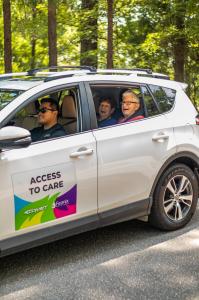Feonix Awarded $6 Million NIH Award to Research Transportation Barriers' Impact on Health Equity
National nonprofit to spearhead study on how lack of transportation worsens health disparities
LINCOLN, NEBRASKA, UNITED STATES, September 28, 2023 /EINPresswire.com/ -- Feonix - Mobility Rising today announced receipt of a $6 million, five-year award from the National Institutes of Health (NIH) to spearhead groundbreaking research into how lack of transportation perpetuates health disparities. As one of only 25 awardees nationwide, Feonix will collaborate with academic, community and transportation partners to illuminate transportation barriers and pilot innovative solutions improving healthcare access, nutrition, education, employment and more for underserved communities.The competitive award comes from the NIH Common Fund’s new Community Partnerships to Advance Science for Society (ComPASS) initiative. ComPASS represents a paradigm shift by directly funding community organizations to lead scientific investigations into social determinants of health.
Feonix will collaborate with the University of Michigan, Michigan State University, Texas A&M Transportation Institute (TTI) and Southern Methodist University (SMU) and partner with more than 20 community groups in Detroit and Dallas.
“We are extremely honored to receive this highly selective NIH grant, empowering us to shed light on how transportation inequities harm underserved communities’ health and well-being,” said Valerie Lefler, Executive Director, and CEO of Feonix. “The research will provide data-driven insights to guide our mission of designing mobility solutions that demonstrably advance health equity nationwide.”
The ComPASS-funded study will engage vulnerable populations bearing the greatest transportation burdens, including seniors, people with disabilities, communities of color, residents of rural areas and neighborhoods in persistent poverty.
Utilizing a mixed methods approach, Feonix and partners will conduct comprehensive surveys, focus groups, geospatial analyses, transportation data reviews and other techniques to uncover specific mobility barriers in Detroit and Dallas. The findings will inform the development of tailored structural interventions and solutions aimed at overcoming those local challenges.
Feonix will then implement and rigorously evaluate multi-year pilot programs enhancing transportation access in Detroit and Dallas, quantifying impacts on health outcomes, including missed medical appointments, chronic disease management, food security, preventative care access, mental health and more.
“We strongly believe transportation is foundational for healthcare access, nutrition, education, employment and overall wellness,” said Lefler. “This pioneering NIH-funded research will demonstrate how Transportation Assistance Hubs (TAH) can dramatically uplift community health across the United States.”
Key findings and best practices will be shared nationally to assist additional communities in improving mobility and public health outcomes.
The ComPASS program recognizes the unique value community organizations like Feonix contribute to research through their on-the-ground experience and community trust. “We are thrilled to collaborate meaningfully with our academic and community partners to study challenges from the people’s viewpoint and co-develop solutions,” Lefler said.
ComPASS also fosters stronger ties between community organizations and academic researchers, enabling them to work as true partners throughout the scientific process.
“This NIH grant provides an unprecedented opportunity for us to spearhead impactful health research grounded in real-life needs,” Lefler added. “We are honored to help create a new model of equitable, community-powered research partnerships.”
The potential impact of improved transportation access is far-reaching, as lack of transportation is a major barrier preventing access to healthcare, food, school, work and other essentials for thriving.
The ComPASS initiative recognizes the importance of community-engaged and community-driven research in developing sustainable solutions to entrenched health disparities.
“We believe everyone deserves access to reliable, affordable transportation, regardless of income or ability,” said Lefler. “This NIH-funded work will provide a framework to continue making transformational mobility advancements nationwide.”
The project is funded by the NIH Common Fund through award number OT2OD035839. For more information and to donate, visit feonix.org/mission.
About Feonix
Feonix - Mobility Rising, established in 2018, is a dedicated 501(c)(3) non-profit organization whose mission is to alleviate transportation insecurity across communities in the United States. With an emphasis on filling the gaps in the social service ecosystem, it provides essential transportation services to those who lack access to healthcare, pharmacies, grocery stores and employment. Collaborating with local transportation providers, Feonix recruits and trains volunteers to offer free or low-cost rides to individuals in need, ensuring all transportation is accessible to people with mobility challenges through specialized online disability training for transportation professionals. Additionally, the organization encourages societal involvement through volunteer drives, partnerships and donations, continually expanding its network to build resilient communities and foster societal well-being and development.
Media Relations
Feonix - Mobility Rising
email us here
Legal Disclaimer:
EIN Presswire provides this news content "as is" without warranty of any kind. We do not accept any responsibility or liability for the accuracy, content, images, videos, licenses, completeness, legality, or reliability of the information contained in this article. If you have any complaints or copyright issues related to this article, kindly contact the author above.



